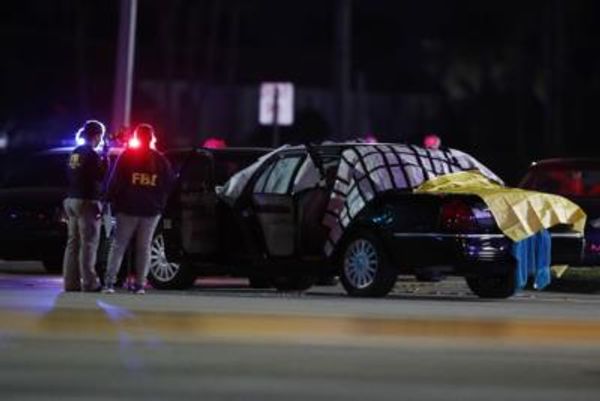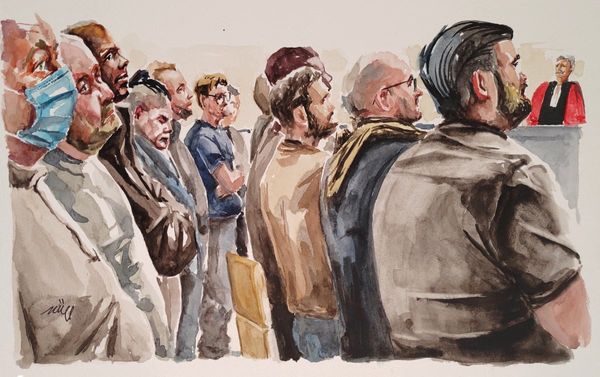TORONTO — Alt-rock raconteur Duane Lavold rattled MTV censors who banned his salacious "Hey Mister" music video from the airwaves, but those closest to the musician say he was a gentle giant who aspired to greater heights than the controversy he drew in the post-Napster era.
The Edmonton-born performer, whose creative endeavours included directing INXS frontman Michael Hutchence and shooting his own videos, died Dec. 18, 2021, after suffering a cardiac arrest during a trip to Greece. He was 54.
At a towering six-foot-eight-inches, Lavold was a sight to behold in any setting and at parties, his thundering baritone voice drew in new friends like a magnet.
"He was larger than life in many ways," explained his sister Kathy Lavold, speaking on behalf of the family.
"(Duane) was a son, but he's also the sun we all orbited around."
Lavold's burst of attention came in the early 2000s as the rebel yell of Sum 41 smacked against the roar of supergroup Audioslave. Custom sounded like neither, but radio programmers found he fit comfortably on their testosterone-fuelled playlists.
Growing up partly in Calgary, Lavold was a wunderkind on the slopes but his greater love was music. He learned cello and keyboard as a child and recorded his earliest songs on cassette.
In the late 1980s, he enrolled in international commerce at Brown University where he met Duncan Sheik, an aspiring singer-songwriter who would land a Billboard Hot 100 hit in 1996 with "Barely Breathing."
The two bonded over music and when Lavold moved to Los Angeles years later, Sheik collaborated on his early demos.
"Duane had these amazing, really big, broad conceptual ideas," Sheik recalled.
"I was there to help him get the nuts and bolts of the music."
Lavold spent the latter part of the 1990s as an independent filmmaker. His short "Loafing" earned an audience award at the 1997 Slamdance Film Festival, leading him to connect with INXS singer Hutchence who starred in his feature directorial debut "Limp."
But Hutchence's suicide shortly after filming threw a shadow over "Limp," and though completed, the project was never released.
By 1999, Lavold had relocated to a sprawling warehouse loft in New York City's Chinatown neighbourhood. With the help of his dad, he constructed a recording studio in the centre of the space and adorned the living room with disco balls, and skate- and surfboards.
It soon became a refuge for twentysomething New York dilettantes and scenesters.
"He had this open-door policy," remembered Peter Sheik, Duncan's younger brother who became close friends with Lavold shortly after turning 19.
"You would go over there to hang out, but then you'd wind up making a song.... There became a thriving ecosystem."
It was here that Lavold polished his stage persona Custom, a name he adopted after friends noticed at the Canadian border that Duane's first name was a single letter off of the French word for customs – douane.
Around that time, Lavold inked a major deal with Virgin Records but he wrestled free of the contract after clashing with an executive. The industry was headed into one of its most tumultuous periods as MP3 piracy threatened to upend the business model, but for now, money was still flowing freely.
Lavold signed with Artistdirect, an untested label created by former Interscope Records co-founder Ted Fields. His self-produced debut album "Fast" hit stores in 2002, and the lead single "Hey Mister" caught fire on rock radio, fuelled by lyrics that provoked accusations of misogyny.
In the song, Lavold sings from the perspective of a man telling his girlfriend's father about their sordid bedroom antics. As the song closes, he muses on the idea of being a father himself by repeating: "I hope I never have a daughter."
In the music video, directed by Lavold in a guerrilla documentary style, he and his then-girlfriend Caitlin Levin play a couple who elope to Las Vegas and burn through her father's credit card.
MTV executives weren't amused and banned "Hey Mister" from their programming.
Lavold said the music channel objected to everything from the lyrics to the video's focus on Levin's body and didn't understand that he was trying to skewer the double standard applied to women's sexuality.
"It's terrible that an 18-year-old woman is vilified and would probably be locked in a closet if she went out on a Friday night to get laid, but if her brother did the same, he'd get a pat on the back from most dads," he told the New York Post in a 2002 interview.
The MTV dustup gave "Hey Mister" some extra attention. The single peaked at No. 20 on the Billboard Alternative Songs chart and No. 28 on the Mainstream Rock Tracks chart.
Meanwhile, Lavold was becoming a celebrity in New York nightlife. His friends say almost every hot spot welcomed the musician with open arms, while his loft afterparties became known for wild shenanigans and the occasional celebrity sighting.
"I remember waking up at four in the morning," his ex-girlfriend Levin remembered.
"(Duane was) telling me, 'Caitlin, come out in the living room. Somebody wants to play you a song on the piano.' And there was Axl Rose serenading me in my pyjamas."
Custom's second single "Beat Me" was a beatbox opus featuring elaborate wordplay that ascends to a soaring, stringed chorus. A lavish music video portrayed the singer narrowly dodging death as cars plummet from the sky.
"Beat Me" failed to duplicate the success of "Hey Mister" and other signs of trouble followed. His label slipped into financial turmoil and "Fast" never saw a release on digital platforms; only illegitimate copies exist on YouTube.
Friends say Lavold spent years trying to distil his ideas into one cohesive project. While he recorded enough material for several albums, almost none of that music was released.
"Duane was only ever interested in hitting grand slams," Peter Sheik said.
"I always thought that hamstrung him a bit because then nothing was ultimately good enough."
As the years wore on, Lavold's generosity never waned, even when living large was clearly unsustainable. He insisted on picking up the cheque for his entourage of 10 or more people, which usually cost thousands of dollars a night.
Around the dawn of the YouTube era in 2007, he plotted a digital technology brand that would produce narrative videos for online viewers. The company never got off the ground.
He also talked about returning to filmmaking with a script tentatively titled "The Hockey Movie," about two heshers who embark on a road trip across Canada. Financing never came through.
Friends say his side projects were always in service of returning to music and a lifestyle he could share with those he loved.
"He wanted everyone to be a part of the dream," said Levin.
"He had so much glory. And unfortunately, music is the most challenging business to be in. Not everyone is successful. But he had more success than most."
This report by The Canadian Press was first published Feb. 16, 2022.
David Friend, The Canadian Press







